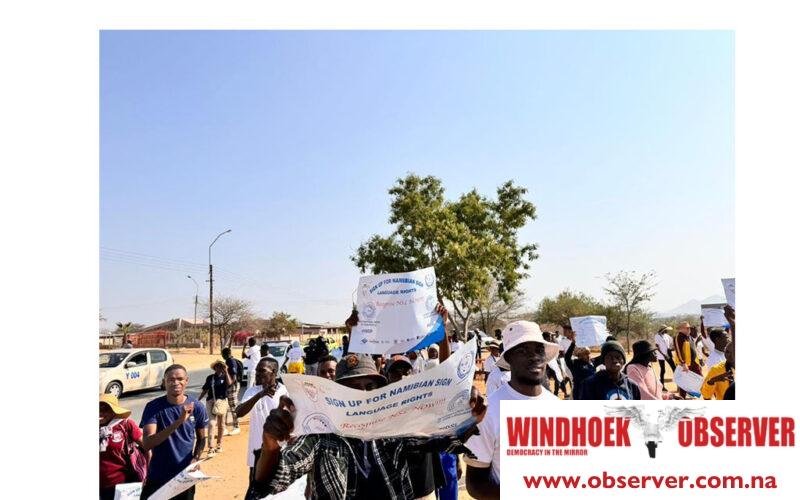Hertta-Maria Amutenja
The Namibian National Association of the Deaf (NNAD) is calling on the government to recognise Namibian Sign Language as an official national language, emphasising its importance for the inclusion and empowerment of the Deaf community.
The call coincided with the celebration of the International Week of the Deaf and International Day of Sign Language, which began on Monday, with the theme, ‘Sign up for Sign Language Rights.’
The NNAD founder, Martin Tjivera, stressed that official recognition would ensure access to essential services for deaf people.
“We urge the Namibian government to recognise Namibian Sign Language as one of the country’s national languages. This recognition would ensure the provision of interpreters in government offices, courts, hospitals, and schools,” Tjivera said.
The event was held in Windhoek at the Gateway Centre to highlight the need for increased awareness and advocacy for deaf rights.
According to Tjivera, without this recognition, Deaf individuals continue to face significant barriers to their human rights and full participation in society.
He called for collective action to ensure Deaf individuals have access to education, healthcare, and public services.
“Inclusive education means that every child, including Deaf learners, must have access to quality education in their preferred mode of communication,” he said.
Tjivera urged the Ministry of Education to train more teachers in Namibian sign language and provide adequate resources for deaf students.
The event also focused on the need for digital inclusion for the Deaf community.
Last week, the NNAD national executive director, Paul Nanyeni, told the Windhoek Observer that many deaf individuals struggle to access digital communication tools, which limits their participation in society.
He urged Telecom Namibia, MTC, and Paratus to tailor their packages to meet the needs of the Deaf community.
The need for sign language advocacy was echoed by Deputy Minister of Disability Affairs, Alexia Manombe-Ncube, who spoke at the event.
“Opportunities are available, both at NNAD and at NAMCoL. By learning sign language, you can communicate with members of the Deaf community without requiring a sign language interpreter,” she stated.
Manombe-Ncube said her motion was tabled last year in parliament for the recognition of Namibian sign language and the appointment of interpreters for live parliamentary debates.
“We are still awaiting feedback from the Parliamentary Standing Committee. However, I am very positive about the outcome,” she said.
Both Tjivera and Manombe-Ncube called for collaboration among the government, private sector, and civil society to ensure the full participation of Deaf Namibians in all aspects of life.
The World Federation of the Deaf (WFD), an international non-governmental organisation in official liaison with ECOSOC, UNESCO, ILO, WHO, and the Council of Europe, has launched a Global Leader Challenge to encourage national and global leaders to use national sign languages in partnership with their national associations of deaf people.
It calls for Prime Ministers, Presidents, government officials, parliamentarians, and regional and local authority councils to join this challenge by using their national sign language.
Manombe-Ncube said she expects parliamentarians to sign the challenge when parliament resumes.
“We have switched on the light for the indication that we are celebrating the day,” he said.
The videos of leaders using sign language should be published on social media with the hashtags #IDSL and #GlobalLeadersChallenge, tagging @Wfdeaf.




